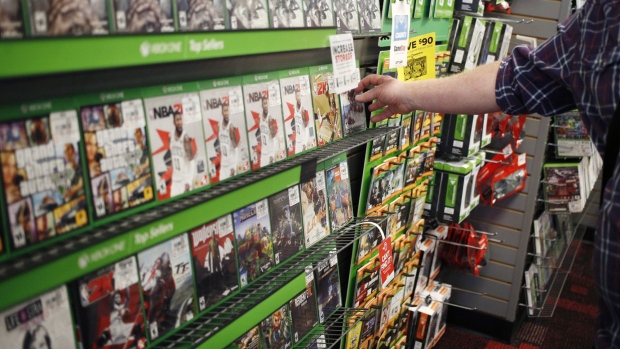Jan 27, 2021
What’s the $23 Billion GameStop Really Worth? Maybe $2 Billion
, Bloomberg News

(Bloomberg) -- With GameStop Corp. soaring once again to record highs on Wednesday, sending its market value above $23 billion, the ailing video-game retailer is now worth nearly as much as Delta Air Lines Inc. and more than Kellogg Co.
This is a company that some analysts essentially wrote off a year ago, that has been shuttering hundreds of stores, that has struggled for years to regain relevance in the era of Amazon.com Inc.
But GameStop’s shares are no longer rooted in business reality after Reddit fans propelled them to stratospheric highs -- part of a now well-documented phenomenon that has spread to AMC Entertainment Holdings Inc. and Tootsie Roll Industries Inc.
GameStop is currently worth more than almost 90% of U.S. companies in the Russell 3000. And it trades for about 67 times its book value, which would put it in 34th place in the index -- just behind Zoom Video Communications Inc.
So what is GameStop really worth, if we lived in a world where the Redditors had never gone down this path? Probably around $2 billion.
At around $326, the share price is more than 10 times higher than it would be based on the company’s fundamentals. Analysts typically look at cash flow, growth and debt to figure out target prices. Of course, that system hasn’t worked as well in the current era, but it still provides a sense of what GameStop might be worth in a parallel universe -- or in this universe, once the hysteria subsides.
“I think it’s fair to say that the market is completely disconnected from GameStop fundamentals here,” said Matthew Kanterman, an analyst at Bloomberg Intelligence.
GameStop, based in Grapevine, Texas, has declined to comment on its stock runup.
The company has long been struggling, even after varied attempts to revamp its business, including a failed push into offering mobile phones. New game consoles introduced in the fall provided a jolt to sales, but revenue is still projected to decline by 18% this fiscal year.
While next year should be better, with single-digit growth, free cash flow may drop by about 114%, according to Bloomberg estimates. The company has been scaling down its operations and -- like most brick-and-mortar retailers -- is still reeling from Covid-19. In the long run, it faces a shift to online games that will be difficult for a sprawling physical chain to adapt to.
“Fundamentals are about companies that eventually return the cash to shareholders, usually in terms of dividends, but there’s no way that GameStop is going to do that,” said Anne Stevenson-Yang, J Capital Research co-founder.
Turnaround Plan
Activist investor Ryan Cohen, who made a fortune running Chewy.com, is seen as a potential savior of GameStop. He wants to expand GameStop’s product line to be more like Amazon’s.
But a turnaround would take time and is by no means certain to succeed.
“I’m skeptical -- even now with the Cohen regime -- that they can meaningfully steer the ship out of this,” Kanterman said. “They have tried and failed multiple times in the past to diversify away from physical-games retail -- mobile phones, collectibles, making and publishing their own video games -- only to eventually exit all of those businesses in turn.”
GameStop said during its last quarterly call that it would announce its strategy in January. And Cohen recently joined the retailer’s board, offering fresh hope.
But without knowing what the plan is, it’s hard to make firm assessments.
“I have a $16 price target based on $1 of earnings power,” said Michael Pachter, an analyst at Wedbush Securities. “It’s possible that Ryan Cohen could come up with a plan that would allow me to raise my estimates, but I haven’t seen it yet, so am keeping my target till he shows me a path to greater profits.”
©2021 Bloomberg L.P.





